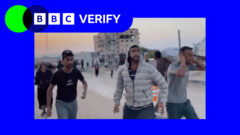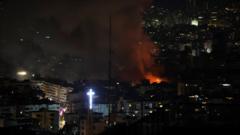As tensions rise in Gaza, Yasser Abu Shabab, a leader of a Palestinian militia backed by Israel, faces accusations of looting aid while operating near a crucial border point.
Leadership of a Controversial Militia in Gaza Explored

Leadership of a Controversial Militia in Gaza Explored
Yasser Abu Shabab emerges as a key figure amidst tensions in Gaza, allegedly receiving support from Israel and accused of looting humanitarian aid.
Yasser Abu Shabab, a Bedouin man in his 30s, commands significant influence in eastern Rafah, an area adjacent to a vital border crossing between Israel and Gaza. Recognized as the leader of the Popular Forces, a Palestinian militia allegedly supported by Israel to counter Hamas, Abu Shabab's group has denied accusations of receiving weaponry from Israeli authorities.
Over the past few months, humanitarian officials and local Palestinians have accused him of looting aid trucks set for distribution across Gaza, where food insecurity has sharply risen. This situation raises vital questions about the implications of his militia's actions and the broader Israeli strategy regarding Hamas and post-conflict governance in Gaza.
Prime Minister Benjamin Netanyahu's recent statements underscore Israel's tactical support of local clans in Gaza opposed to Hamas, suggesting a strategic alliance with Abu Shabab's group under security recommendations. Analysts interpret these moves as indicative of Netanyahu’s uncertain stance on the future leadership of Gaza, as the Popular Forces remain notably smaller than Hamas.
Amid these dynamics, concerns mount regarding how Abu Shabab's militia interacts with both the local populace and the more dominant Hamas group, as Israel navigates its involvement in the region to bolster its security interests while addressing humanitarian crises.






















